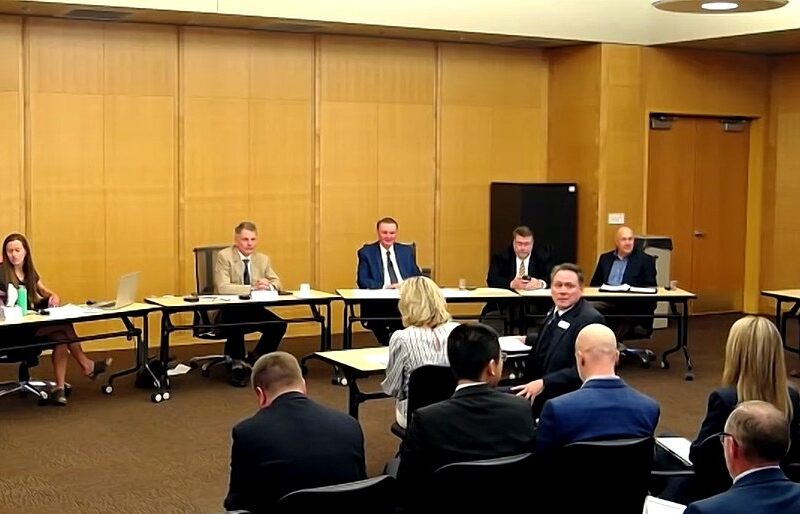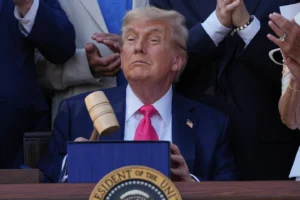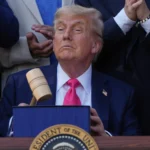Amid Fed Crackdown, Bankers Question the Point of Wyoming’s Planned Cryptocurrency
State adds three crypto and banking experts to its stable token commission
- Published In: Politics
- Last Updated: Jun 09, 2023

Wyoming Bankers Association President Scott Meier turns toward the audience while addressing the Wyoming Stable Token Commission in Laramie. Meier and Jonah Bank CEO Kim DeVore (to Meier’s left) critiqued the state’s plans to issue a digital version of the dollar. (Courtesy photo from the State of Wyoming via Zoom)
By CJ Baker
Special to the Wyoming Truth
Wyoming leaders continue to push forward with plans to launch a digital version of the dollar, but the effort isn’t without its critics. This week, Wyoming bankers pushed back on whether there’s a need for a state-issued “stable token” — and warned federal regulators may stymie the effort.

Ahead of the Wyoming Stable Token Commission’s Tuesday meeting in Laramie, the Securities and Exchange Commission (SEC) separately sued two of the world’s largest cryptocurrency exchanges, Binance and Coinbase, alleging they violated securities laws. It was only the latest in a broader crackdown on the crypto industry, which suffered a series of high-profile collapses last year.
“It would appear to me that the federal regulators are starting to say, ‘No more of this monkey business in this world,’” Wyoming Bankers Association President Scott Meier told the stable token commission. “So I don’t know how you’re going to deal with that … And it causes me concern, because I think people don’t realize how much power the feds really have.”
Gov. Mark Gordon, who chairs the commission, countered that federal regulators are stifling financial innovation and potentially putting the dollar’s status as the world’s dominant currency at risk. While the “very stodgy” Federal Reserve “can’t even get out of its own way,” China “is moving forward very quickly” to launch a digital version of its yuan, Gordon said.
“We are in a global arms race on that front,” he said, and “if we don’t look at other forms of settlement, we will be in trouble.”
The Federal Reserve is on the verge of launching a new system called FedNow that will allow institutions to make instant payments around the clock. And the Fed has been exploring the possibility of launching a central bank digital currency (CBDC), which would be a true digital dollar. But the idea of a CBDC has run into resistance from those who fear it would be used to track and even control everyday purchases.
“The federal government wants to know what everybody, I think, does and where they spend all of their money,” said State Treasurer Curt Meier, a stable token commission member. “… I guess one of the things I think that we’re preparing for is when that actually happens. And frankly, there’s people that believe it’s going to happen sooner rather than later.”

The treasurer and other state officials have expressed hope that Wyoming’s stable token can offer more privacy and freedom than a CBDC issued by the Fed and more trustworthiness than the stablecoins currently being issued by private firms.
Each token the state issues will be backed by a dollar in the real world and customers will be able to redeem their tokens for cash at any time. While the tokens are being used on a blockchain, the state will invest the cash in short-term Treasury bills to earn a profit.
One potential use case for Wyoming’s token is to facilitate faster and cheaper payments. While payment processors typically charge, blockchains can process transactions for cents or fractions of a cent. A Cheyenne-based company called hopes to offer “zero cost” transactions and entice major merchants to use Wyoming’s token to process trillions of dollars’ worth of purchases; organizer Scott Moeller said the benefits for the state “can just be astounding.”
A question of risk
However, Wyoming bankers are among the skeptics, and they object to the state getting involved in what they see as their space.

“I’m anxious to see your business plan,” said Scott Meier. “Because right now, as I look at this thing, what you’re trying to offer is something that is already being provided in your private sector.”
Jonah Bank CEO Kim DeVore said money used to buy Wyoming stable tokens is money that isn’t being deposited in community banks or loaned out to individuals and businesses.
“That’s what creates economic development in this state,” said DeVore, who also sits on the Wyoming Business Council. “Businesses thrive in our state because they have the ability to borrow.”
Treasurer Meier and Gordon said they want the state’s banks to benefit from the new token and other financial innovations, but DeVore said they’re busy complying with federal regulations. She asked the state to instead help break down some of the existing regulatory barriers faced by smaller institutions.
“Community banks may want to get into the [crypto] space,” DeVore added. “But until there’s a federal framework, we’re not willing to risk our charters to do so.”
One federal regulator, SEC Chair Gary Gensler, suggested to CNBC this week that there’s no need for cryptocurrencies, saying “there’s a lot of debate as to use cases and whether there’s any ‘there’ there.”
Wyoming companies have already run into roadblocks: The Federal Reserve denied membership and a master account to one of Wyoming’s crypto-focused banks , Custodia; the SEC has taken multiple actions against American CryptoFed; and the SEC asserted this week that ADA — the native token of the Cardano blockchain created by Wyoming-incorporated Input Output — is an unregistered security.

Cardano cofounder and Wyoming stable token supporter Charles Hoskinson recently described the crackdown on crypto as part of an ongoing fight “between freedom and authoritarianism.” He charged that the end goal is an “agenda-based CBDC partnered with a handful of massive banks and end-to-end control over every aspect of your financial life.”
An opportunity and a challenge
J.J. Siler of Input Output attended Tuesday’s meeting to reiterate the company’s support for Wyoming’s token, calling it “incredibly important.” Siler said the project could diversify the state’s economy and that the commission must ensure “that this isn’t captured by private industry, that this isn’t captured by federal regulators, and that this is serving the state of Wyoming first and foremost.”
“It’s a big moment for Wyoming,” he said.
Beyond the regulatory uncertainty, the commission must complete a host of tasks before it can launch the project, such as hiring an executive director, determining the token’s technical specifications and complying with federal banking laws..
It all needs to be done quickly, as the Legislature asked the commission to issue the first token by the end of the year. The timeline is intended to ensure Wyoming is the first government to offer such an asset, but it’s aggressive.
Commissioners Gordon, Meier and State Auditor Kristi Racines are getting some help, as they added three subject matter experts to the board:
- Flavia Naves, the outgoing general counsel for Circle, which issues the world’s second-largest stablecoin, USDC;
- David Pope, a Cheyenne-based CPA who helped launch the state’s blockchain efforts; and
- Jeff Wallace, the CEO of Wyoming Bank & Trust in Cheyenne and a member of the board of directors for the Federal Reserve Bank of Kansas City’s Denver Branch.
One spot on the commission remains open, while the panel intends to appoint additional experts to various subcommittees.
As the more than three-hour conversation came to a close, Gordon offered that, “I think you get an idea of how interesting this discussion will become at our next meetings.”
The commission meets again June 28.













